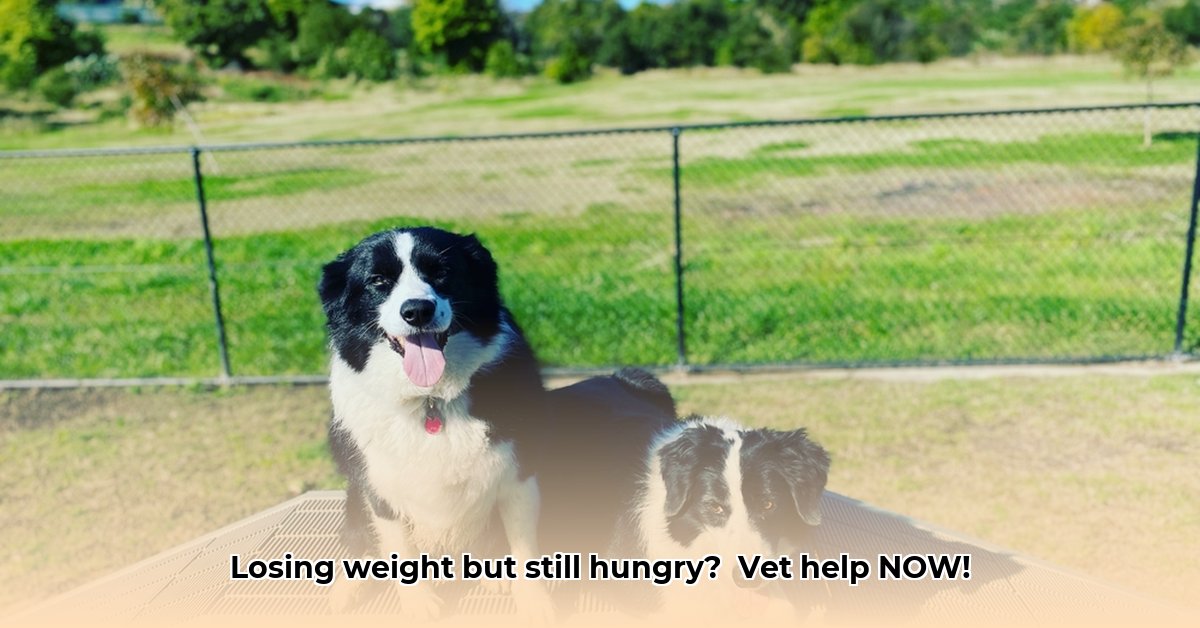
Understanding Unexplained Weight Loss in Dogs
Seeing your dog lose weight despite maintaining a seemingly normal appetite is alarming. This isn't just a minor issue; it's a sign that something might be seriously wrong. Don't delay seeking veterinary help. This guide will help you understand potential causes, symptoms, and what to expect during a veterinary visit. Remember, this information is for educational purposes only and shouldn't replace professional veterinary care.
Possible Causes of Weight Loss Despite Normal Appetite
Several underlying health conditions can cause your dog to lose weight despite eating normally. Some are more serious than others; prompt veterinary attention is vital for accurate diagnosis and treatment. Let's explore some of the most common possibilities:
Kidney Disease: (Kidney failure) Kidneys filter waste from the blood. When they malfunction, toxins build up, impacting appetite and causing weight loss. Other symptoms include increased thirst and urination.
Liver Disease: (Hepatic insufficiency) The liver processes nutrients. If damaged, digestion and nutrient absorption are disrupted, leading to weight loss.
Cancer: Cancer cells consume energy, potentially robbing your dog of necessary nutrients, resulting in weight loss. This can often be accompanied by lethargy and changes in behavior.
Diabetes Mellitus: (Diabetes) This metabolic disorder affects the body's ability to use sugar for energy, leading to weight loss, increased thirst, and frequent urination.
Pancreatitis: (Inflammation of the pancreas) The pancreas aids digestion. Inflammation disrupts this process, hindering nutrient absorption and causing weight loss.
Inflammatory Bowel Disease (IBD): Chronic inflammation in the digestive tract impairs nutrient absorption. Often accompanied by diarrhea, vomiting, and changes in stool consistency.
Dental Problems: Painful teeth or gums make eating difficult, leading to reduced food intake and subsequent weight loss.
Hyperthyroidism: (Overactive thyroid) An overactive thyroid speeds up metabolism, resulting in weight loss despite a normal appetite.
Heart Disease: A weakened heart struggles to circulate blood effectively, impacting nutrient delivery and causing weight loss. Often accompanied by fatigue and breathing difficulties.
Parasites: Internal parasites compete with your dog for nutrients, leading to gradual weight loss. This can be accompanied by other digestive issues.
Recognizing the Symptoms of Weight Loss
Early detection is crucial. Monitor your dog for these symptoms, some of which may be subtle:
| Symptom | Description | Severity |
|---|---|---|
| Gradual Weight Loss | Noticeable decrease in body condition over time; visible ribs or hip bones. | Moderate to Severe |
| Lethargy/Decreased Energy | Reduced playfulness, increased sleeping, less interest in walks. | Moderate to Severe |
| Appetite Changes | Eating less enthusiastically, leaving food in the bowl, changes in food preferences. | Mild to Moderate |
| Stool Changes | Diarrhea, constipation, changes in stool consistency, frequency, or color. | Mild to Severe (depends on duration and type) |
| Increased Thirst/Urination | Drinking more water and urinating more frequently than usual. | Moderate to Severe |
| Vomiting or Regurgitation | Forceful vomiting or passive regurgitation of food. | Mild to Severe (depending on frequency) |
| Changes in Coat Condition | Dull, dry coat, hair loss or excessive shedding. | Mild to Moderate |
When to Seek Immediate Veterinary Attention
Don't hesitate to contact your veterinarian immediately if you observe any of the following serious warning signs:
- Rapid Weight Loss: Significant weight loss within a short period.
- Extreme Lethargy: Your dog is unresponsive and extremely weak.
- Persistent Vomiting/Diarrhea: Ongoing vomiting or diarrhea that doesn't improve.
- Difficulty Breathing: Your dog appears to be struggling to breathe.
- Complete Loss of Appetite: Your dog has completely stopped eating.
Your Veterinary Visit: What to Expect
Your veterinarian will conduct a thorough physical examination and likely order several tests:
Bloodwork: To assess organ function, detect infections, and identify underlying health problems (e.g., kidney disease, liver disease).
Urinalysis: To evaluate kidney function and detect urinary tract infections.
X-rays or Ultrasound: To visualize internal organs and detect abnormalities.
Fecal Exam: To identify intestinal parasites.
Treatment Options: A Tailored Approach
Treatment will depend entirely on your veterinarian's diagnosis. Options may include:
- Medications: To manage conditions like IBD, kidney disease, or hyperthyroidism.
- Dietary Changes: Special diets tailored to your dog's specific needs and underlying health issues.
- Surgery: Might be necessary for dental issues, tumors, or other surgical conditions.
Preventative Care: Proactive Pet Ownership
Proactive care is crucial in preventing weight loss and other health problems. This includes:
- Regular Veterinary Checkups: Routine checkups allow for early detection of potential issues.
- Balanced Nutrition: Provide a diet appropriate for your dog's age, breed, and activity level.
- Parasite Prevention: Regularly administer preventative medications to control internal and external parasites.
- Dental Hygiene: Maintain good dental health through regular brushing and professional cleanings.
Remember: This guide provides general information. The information presented here is not a substitute for professional veterinary advice. Always consult your veterinarian for any health concerns regarding your dog. Early detection and prompt veterinary care are vital for your dog's well-being.